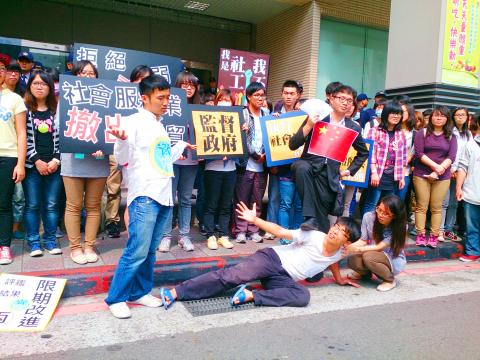Legislative Speaker Wang Jin-pyng (王金平) yesterday said that he would find a workable proposal to break the deadlock between the government and the student movement over the cross-strait service trade agreement.
After an inter-party negotiation at Wang’s residence broke down for the third time yesterday in as many days, Wang called for party caucuses to submit proposals to resolve the controversy.
“The negotiations will continue. If no progress is made and if party caucuses agree, I will try to work out an initiative,” Wang said.

Photo: CNA
The Chinese Nationalist Party (KMT) and the Democratic Progressive Party (DPP) each set four preconditions for their proposals.
The KMT said it would agree to send the trade pact back to the joint review committee and allow the pact to be reviewed clause-by-clause, but on the condition that the DPP not boycott the proceedings convened by Wang at a location to be decided.
KMT caucus whip Lin Hung-chih (林鴻池) said the party was prepared to make the concession to end the current turmoil as soon as possible.
The DPP rejected the proposal, saying that the KMT’s proposal was not in line with mainstream public opinion and that Wang could not convene a committee meeting, under Legislative Yuan regulations.
DPP caucus convener Ker Chien-ming (柯建銘) said the DPP demanded that the pact only be reviewed after the establishment of a monitoring mechanism on cross-strait agreements and with the opportunity to revise the content of the agreement.
The party also asked that no timetable be set for the passage of the pact and that a document request committee be established to investigate the Executive Yuan’s order of a police crackdown on students in the Executive Yuan early on Monday morning.
In an earlier cross-party negotiation on Tuesday, Wang reportedly took issue with the KMT caucus’ suggestion that he should preside over the review process, complaining to Lin that his party was attempting to shift all the responsibility for resolving the standoff on to the legislative speaker.
“Is it right to ask me to handle all of this?” Wang reportedly asked Lin.
The cross-strait service trade agreement, which was signed June last year between Taiwan and China, has been stuck in the Legislature ever since, amid boycotts and fights among KMT and DPP lawmakers for control of the podium, and more recently has drawn public protests.
Additional reporting by CNA

Alain Robert, known as the "French Spider-Man," praised Alex Honnold as exceptionally well-prepared after the US climber completed a free solo ascent of Taipei 101 yesterday. Robert said Honnold's ascent of the 508m-tall skyscraper in just more than one-and-a-half hours without using safety ropes or equipment was a remarkable achievement. "This is my life," he said in an interview conducted in French, adding that he liked the feeling of being "on the edge of danger." The 63-year-old Frenchman climbed Taipei 101 using ropes in December 2004, taking about four hours to reach the top. On a one-to-10 scale of difficulty, Robert said Taipei 101

A preclearance service to facilitate entry for people traveling to select airports in Japan would be available from Thursday next week to Feb. 25 at Taiwan Taoyuan International Airport, Taoyuan International Airport Corp (TIAC) said on Tuesday. The service was first made available to Taiwanese travelers throughout the winter vacation of 2024 and during the Lunar New Year holiday. In addition to flights to the Japanese cities of Hakodate, Asahikawa, Akita, Sendai, Niigata, Okayama, Takamatsu, Kumamoto and Kagoshima, the service would be available to travelers to Kobe and Oita. The service can be accessed by passengers of 15 flight routes operated by

Taiwanese and US defense groups are collaborating to introduce deployable, semi-autonomous manufacturing systems for drones and components in a boost to the nation’s supply chain resilience. Taiwan’s G-Tech Optroelectronics Corp subsidiary GTOC and the US’ Aerkomm Inc on Friday announced an agreement with fellow US-based Firestorm Lab to adopt the latter’s xCell, a technology featuring 3D printers fitted in 6.1m container units. The systems enable aerial platforms and parts to be produced in high volumes from dispersed nodes capable of rapid redeployment, to minimize the risk of enemy strikes and to meet field requirements, they said. Firestorm chief technology officer Ian Muceus said

MORE FALL: An investigation into one of Xi’s key cronies, part of a broader ‘anti-corruption’ drive, indicates that he might have a deep distrust in the military, an expert said China’s latest military purge underscores systemic risks in its shift from collective leadership to sole rule under Chinese President Xi Jinping (習近平), and could disrupt its chain of command and military capabilities, a national security official said yesterday. If decisionmaking within the Chinese Communist Party has become “irrational” under one-man rule, the Taiwan Strait and the regional situation must be approached with extreme caution, given unforeseen risks, they added. The anonymous official made the remarks as China’s Central Military Commission Vice Chairman Zhang Youxia (張又俠) and Joint Staff Department Chief of Staff Liu Zhenli (劉振立) were reportedly being investigated for suspected “serious